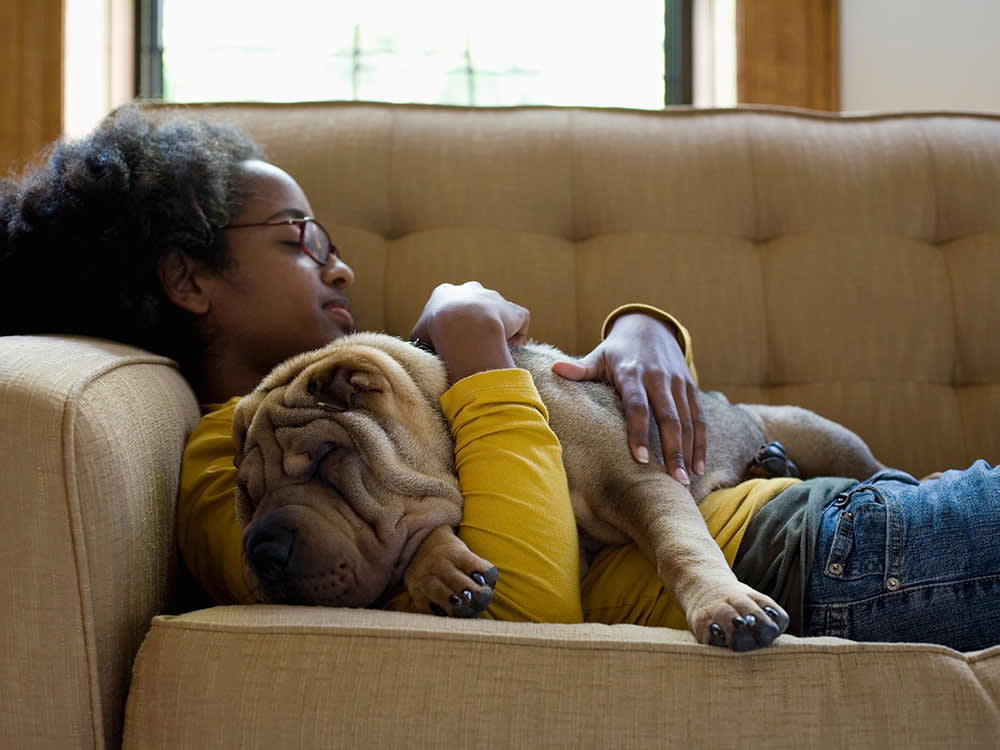CBD Oil for Dogs: Is the Green Stuff Good for Your Pup
There are options everywhere. Here’s how to sift through them — and how it could help your dog.
If you think you’re seeing CBD everywhere you look these days, you’re definitely not imagining things. CBD has exploded onto the market as a hot new addition for beauty products, drinks, supplements, and now it is also sold in some dog treats and supplements, too. If you’ve been curious to try it on your pup, here’s some important information you need to know first.
What is CBD?
CBD stands for cannabidiolopens in new tab, and it is an extract of cannabis plants. Marijuana is a combination of CBD plus THC, tetrahydrocannabinol. THC gives people the feeling of being high. Products made with CBD that contain less than 0.3 percent THC should not cause feelings of being high but will have other effects on the body.
Is CBD good for dogs?
Studies of CBD in dogs are still in their early stages, so there is a lot that we do not know at this point. Many studies are currently underway to determine the most effective doses and the best uses for CBD in dogs. While many sources claim that CBD will treat conditions such as anxiety, pain, nausea, and/or seizures in dogs, this is based on information coming from its effects on humans or other animals.
This means there is still much we do not know about whether it is actually effective in dogs. What we do know is that it is very safe for dogs in the short term, meaning that it would take a very large amount of CBD to be toxic. There can be unwanted side effects with CBD, especially at higher doses, but most are not serious and will resolve as soon as the product is discontinued.
How much do you spend on your pet per year?
Is CBD oil safe for puppies?
CBD oil has not been thoroughly tested or studied in young dogs to know whether or not it is safe for them. Some drugs that are perfectly safe for adult dogs can be harmful to young puppies while their brains and organs are still developing. It is best not to use CBD in puppies under six months of age until more information is available.
How should I administer CBD oil to my dog?
CBD oil can be administered with a syringe or medicine dropper directly into the mouth, or it can be mixed into food. There are also many products available like capsules, treats and chews for dogs that contain CBD oil, making it more appealing for them to eat. CBD may be best absorbed opens in new tab on a full stomach, so you should give it right after a meal.
What are the benefits of CBD oil for dogs?
Most of the suggested benefits of CBD oil in dogs come from studies and/or personal experiences in humans. This includes possible roles in pain relief, reducing anxiety, controlling seizures, stimulating appetite, and/or improving certain skin conditions. Many of these claims have not been thoroughly studied in dogs so it is unclear whether or not CBD actually works in our four-legged friends. There has not been enough research to know what doses would be most effective in dogs for many of these different conditions, so there is a lot of trial-and-error involved in figuring out how much to give and whether or not there is truly an effect. Some conditions seem to show more promise than others in response to CBD.
Pain Relief
Early studies on dogs with arthritis have shown promise when using CBD as a supplemental treatment for pain. In this studyopens in new tab, dogs were treated twice a day for four weeks with CBD oil and they appeared to be more active and have less discomfort while taking the CBD oil. It is important to note that the dogs in this study were also taking a non-steroidal anti-inflammatory pain medication (NSAID), which is considered the gold standard for managing pain related to inflammation and arthritis. It is unclear how effective CBD oil would be alone, but it may be a great supplement to use in combination with NSAIDs.
Anxiety Relief
Initial results on the use of CBD to treat anxiety in dogs are very mixed, and it is not clear if there is a true benefit there. Multiple studiesopens in new tab have looked at CBD as a treatment for different anxiety-related behaviors including stress related to fireworks, stress in shelter dogs, and aggression towards people due to stress. Most studies have not found any improvement in dogs treated with CBD oil in these scenarios. One study did note a reduction in aggression towards peopleopens in new tab among shelter dogs treated with CBD; however, this was not considered significant after statistical analysis.
Seizure Control
In humans, CBD oil extracts have shown benefits in controlling seizures, especially for certain rare genetic conditions. Studies in dogs so far have been inconclusive. Some studies showed a reduction in the frequency of seizures when CBD oil was used in combination with anti-seizure medications, while other studies have not shown any clear benefits.
Inflammation Reduction
Studies in miceopens in new tab have shown that CBD reduces inflammation through many different targets in the pathways that cause inflammation. We do not know yet whether dogs react the same way. In studies on dogs with arthritis and itchy skin, a mild improvement was observed when CBD oil was combined with more established treatments. It may be a great supplement in these cases. It is unclear whether it helps these dogs because of anti-inflammatory effects, or through other effects such as sedation and/or neurological effects on pain perception.
Appetite Stimulation
CBD does not directly stimulate appetite. Most of that perceived effect comes from THC, which is why when people get high they often get the munchies. Since THC can be toxic to dogs, they do not get to experience this. CBD may help to reduce nausea, however. For dogs who are not eating because they feel nauseous, this may indirectly help to improve their appetite. There are other medications approved for dogs that do specifically stimulate their appetite and may be a better choice depending on the underlying medical concern.
Skin Health
Early studies have shown that CBD has anti-inflammatory and immune-modulating effects. Dogs with a condition known as atopic dermatitis, which is a chronic form of itchy skin caused by immune disease, may get some relief from their itchiness with CBD oil. A study on dogsopens in new tab with atopic dermatitis showed that CBD oil did reduce their itchiness in the short-term; however, it did not improve the physical abnormalities with their skin. This suggests it would be most useful in combination with other medications to treat their underlying skin disease.
What does CBD do to dogs?
CBD Oil For Dogs With Cancer
There is evidence in humans and mice that CBD may have tumor-shrinking properties against certain kinds of cancer. It is not clear yet if this holds true in dogs; however, there are other reasons why CBD may be beneficial for dogs with cancer. It can be a helpful supplement to control pain, reduce nausea, and promote sleep.
CBD Oil For Dogs With Epilepsy
CBD has not been shown to be effective as a treatment for seizures on its own. However, it may be a good supplement to use in combination with standard anti-seizure medications.
CBD Oil For Dogs With Arthritis
Dogs with arthritis can take CBD oil as a way to help reduce their pain and inflammation and promote comfortable sleep. On its own, CBD oil is not effective enough to control moderate or severe pain, but when used with non-steroidal anti-inflammatory drugs (NSAIDs), it can increase their comfort and even help them to be more active. With continued research, the hope is that vets will find a way to reduce the dose of NSAIDs if used in combination with CBD. This will minimize side effects as much as possible while maximizing the benefits of both drugs.
CBD Oil for Dogs With Separation Anxiety
To date, there is no good evidence that CBD oil will treat or reduce separation anxiety in dogs. Unfortunately, separation anxiety is a complex behavioral disorder and usually requires a combination of drugs with behavior modification training techniques to see the biggest improvements. CBD can be sedating, so as a short term quick fix, it may take the edge off by making your pup feel sleepy. It does not reduce the stress-related behaviors or feelings of anxiety in dogs with this condition, however.
CBD Oil For Dogs With Skin Allergies
CBD oil may reduce itchiness in dogs with chronic allergic skin conditions and may also reduce the inflammation that contributes to these conditions. Since allergic skin disease is a very complex condition that usually requires combining many different treatments, it is great to have one more tool available to make these pups more comfortable.
Risks of CBD Oil For Dogs
Pure CBD is very safe for use in dogs, and even in large doses it is not considered toxic. It is important to keep in mind that there can still be side effects, and there can be toxicities associated with other ingredients in some of these products. Quality control is also a major challenge at this time since these products are not well-regulated, so it can be difficult to know what you are really buying.
What are the side effects of CBD for dogs?
At low doses, side effects tend to be minimal when pure CBD products are used for dogs. With higher doses, more side effects occur. These tend to be mild and resolve once the product is discontinued. Side effects may include sedation, a wobbly walk, diarrhea, vomiting, and/or changes in appetite. CBD is also known to increase Alkaline Phosphatase, which is routinely measured on blood chemistries, and can be an indication of liver function. Never give marijuana or any products containing THC to dogs. These can be toxic for dogs and there have even been a few fatalities reported.
Drug Interactions
Drug interactions with CBD are still being studied in dogs. CBD is broken down and removed from circulation by the liver. It is possible that other drugs that are also metabolized in this way will be affected by the presence of CBD in circulation. Sometimes the effects are synergistic, meaning that the presence of one drug makes the other drug have a stronger effect, and as a result, a lower dose can be used effectively.
In other cases, the results are antagonistic, meaning that one drug makes another drug less effective, requiring a higher dose. Since this information is not available yet for CBD, it is important to speak with your vet before adding CBD or any other medications to your dog’s routine. It is also a good idea to start at a very low dose and gradually increase the amount so you can monitor for any unusual changes.
Toxic Ingredients
While CBD itself is very safe for dogs, some products may contain other toxic ingredients. Be sure to check the label on any product before giving it to your pup to ensure it is safe. For example, chocolate and/or xylitol, an artificial sweetener, could be found in some human CBD products and these are toxic for dogs. Ideally, opt for a product that is specifically made for dogs.
Quality Control
Unfortunately, there are many products on the market that claim to be potent CBD oils but are just a sham. The FDA does not regulateopens in new tab these products and many studies have found a high percentage of products that are incorrectly labeledopens in new tab. They may contain significantly less CBD than advertised, no CBD at all, or they may have higher percentages of THC than reported. It is important to choose a reliable brand and look for evidence that they have had their product independently tested to confirm the ingredients.
Cost of CBD Oil For Dogs
You get what you pay for when it comes to CBD oil. Prices vary widely, but beware of anything that seems too good to be true because you may be getting a bottle of snake oil. Reputable companies may charge anywhere from 75 dollars and up depending on the size of the bottle. A bottle may last you weeks or months, based on how often you use it and how big your dog is. Most products recommend dosing twice a day in 12-hour intervals and the dose is based on your dog’s weight.
Is CBD oil a good choice for your dog?
CBD oil may be a good choice for your pup depending on what kinds of signs you hope to treat. It is exciting to consider all the possibilities that may come with additional research and experience on the use of CBD for dogs. Always speak with your veterinarian before starting a new supplement such as CBD.
If your dog has suddenly developed a new condition, it is best to see your vet first and get an accurate diagnosis before starting any supplements. Many conditions can have similar signs but very different underlying causes. There may be more effective treatment available once you have a clear diagnosis. As always, if you do try a new supplement such as CBD oil and you are concerned that your dog is having a bad reaction or seems to be acting strange, discontinue it right away and contact your vet.
FAQ (People Also Ask)
1) Is dog CBD safe for puppies?
CBD oil has not been thoroughly tested in young dogs to know whether it is safe for them. Some drugs that are perfectly safe for adult dogs can be harmful to young puppies while their brains and organs are still developing. It is best not to use CBD in puppies under six months of age until more information is available.
2) How often can I give my dog CBD oil?
CBD oil is usually most effective when given twice a day approximately 12 hours apart.
3) What effect does CBD have on puppies?
CBD oil has not been thoroughly tested in young dogs to know whether or not it is safe for them. It may have similar effects in puppies as in adult dogs; however, since their brains and organs are still developing, they are also more at risk for harmful effects.
4) What is a negative side effect of CBD for dogs?
The most common side effects in dogs taking CBD include sleepiness, diarrhea, and changes in their appetite.
5) How should I administer CBD oil to my dog?
CBD oil can be administered with a syringe or medicine dropper directly into the mouth, or given in a capsule, treat, or chew made for dogs. CBD may be best absorbed on a full stomach, so you should give it right after a meal.
6) What are the benefits of CBD oil for dogs?
There are many claims and theories about the benefits of CBD oil for dogs; however, many are unproven. At this time, there is a lot we do not know. Early studies suggest that CBD may be a helpful supplement in the treatment of pain, itchiness, and/or cancer. In these cases, it is used in combination with other medications to get the most benefits.
Disclaimer alert: This article is here to share information. But, much like pineapple on pizza, the topic may be controversial. Meaning, not all vets or pet professionals agree. Because every pet is a unique weirdo with specific needs. So, don’t take this as fact or medical advice. Talk things over with your vet when making decisions, and use your best judgment (about both your pet’s health and pizza toppings).
















